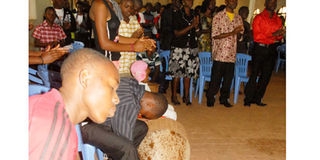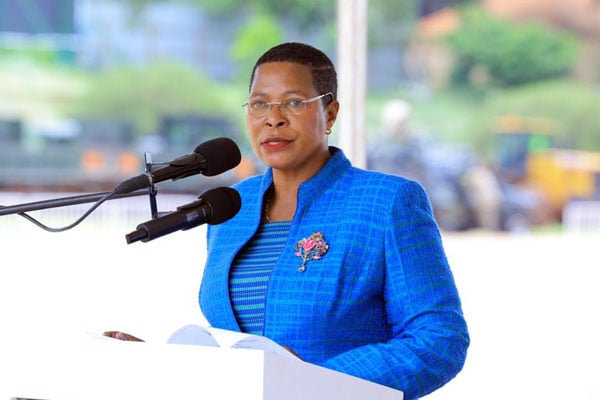SOUTHERN SUDAN: Mudslinging increases as referendum draws near

South Sudanese prayer in Kampala on Sunday. PHOTO BY STEPHEN WANDERA
In our extended coverage of the Southern Sudan referendum, which will take place on January 9, 2011, we look at the ongoing mudslinging as tensions rise in Sudan. As he heads north towards Juba, Benon Herbert Oluka picks on a sub-plot of the stand-off between Sudan’s North and South from the small town of Bombo on the outskirts of Kampala: -
Harroun Yassin, 35, smiles easily and has warmth about him that is instantly welcoming. Within moments of exchanging pleasantries, and despite learning that I had come to probe him rather than buy any items from his wife’s shop that he was tending to in her absence, Mr Yassin offered me a seat and we soon got engrossed in conversation.
By pure happenstance, Mr Yassin found himself in the spotlight to speak for a community that is inadvertently at the centre of allegations hurled back and forth between officials from the government of Southern Sudan and their political adversaries in Khartoum as a result of deep-rooted mutual suspicion between the two parties ahead of the referendum slated to take place on January 9.
It was just as well that Mr Yassin, who is a teacher at Kibuli Secondary School in Kampala, also serves his community as secretary for youth and information at the Nubian Cultural Information Centre in Bombo.
Accusations
During my earlier interview with Samuel Okomi Ananias, the vice chairman of the Southern Sudan Youth Forum for the Referendum, he had cast the Nubian community as a group of spoilers hired by the Khartoum regime to register as voters in Kampala and Nairobi but whose voting cards had then been bought off so that their ballot papers would not be cast.
This, Mr Okomi explained, was a ploy to ensure Southern Sudan did not get the 51 per cent or more that they require to earn the declaration of secession from the north that they so desperately crave. “We were so surprised for the IOM [International Organisation for Migration, which was mandated to register Southern Sudanese in Uganda to vote in the referendum] to go to Bombo to register people who have been there since the 1970s and ‘80s,” argued Mr Okomi. “They don’t have identification but they were given identification cards and passports by the Embassy of Sudan as a plot meant to sabotage the outcome of the referendum.
“Because they are Muslim,” he added, “they have been oriented by the Embassy of Sudan to come and spoil our vote. We have received reports that they have been urged to register but not to vote. When they register and don’t vote, it reduces the percentage to secure independence of the South.”
When the charge was placed before Mr Yassin, he instantly refuted it, saying he was not aware of anything of that nature having happened around Bombo. He added: “If it is there, which I highly doubt, it could have been among the people who work in Southern Sudan. But I have never heard of anybody talking about it.”
None of the Nubians working in Southern Sudan were readily available to comment on the matter. However, Abdul Majid, a father to two girls based in Juba, said if the fate of his children were to serve as an insight into whether the allegations held any water, then he did not believe they were true. “This [allegation] is strange to us. My daughters work there but they have come back because they fear that war could erupt,” said Mr Majid, But then he added a disclaimer: “But conclusively, I can’t say it is not happening.”
The allegation against the Nubian community, some of who came to Uganda during the 19th century to fight alongside the British, is only a microcosm of the mutual mudslinging that has intensified as the referendum date draws closer and the stakes rise.
This week’s referendum is the final part of the 2005 Comprehensive Peace Agreement (CPA), which ended at least 50 years of on-and-off war between Sudan’s North and the South. It offers the people of Southern Sudan the opportunity to vote to choose whether to remain a part of the largely north-led government or secede and become and independent country.
However, as a part of the CPA, both the Khartoum government led by President Omar al-Bashir and their counterparts in the semi-autonomous Juba administration were obliged to work towards making unity attractive to the South before letting the people decide.
Support for secession
This was arguably the hardest part of the bargain for the Southern Sudan government under the Sudan People’s Liberation Movement (SPLM) to keep right from the time the CPA was signed. Amidst incessant accusation from Bashir’s National Congress Party (NCP) that Juba has been quietly campaigning for secession in contravention of the CPA, the SPLM cut all pretences early last month and publicly declared that they would campaign for separation. “Since unity has not been made attractive, we are promoting what our people choose because we are following the people,” said senior SPLM official, Anne Itto, in an interview with the BBC.
However, earlier developments betray Ms Itto’s statement that the Juba government is only following its people. Six months before the referendum, the Southern Sudan government had asked musicians and writers to compose a national anthem for the south.
President Bashir has not been any more forthright, according to the south. They argue that although Gen. Bashir has publicly declared several times that his government is prepared to peacefully accept the outcome of the referendum, his words are a far cry from their actions.
By the end of August 2010, state officials from the South and the North were still haggling over who would head the Khartoum-based Southern Sudan Referendum Commission (SSRC), the body in charge of organising the exercise. After that was finally decided, the South then complained that the North had withheld the funds that they were supposed to release to finance the activities of the referendum commission.
As a result, the referendum commission has had to work under such a tight deadline that there has been a constant cloud of doubt that it would be able to organise a smooth exercise. According to a timetable released by SSRC, the registration of voters, which was to last 24 days, began on November 14, 2010. And by December 10, two days after the last day of registration, the commission had to publish and display a preliminary register.
The voters only had seven days from the publication of the register to file any objections to the information therein, and by December 22 – five days after the late date for submission of objections – Referendum Committees were supposed to have disposed of all objections. Between December 29 and January 3, 2011 was allocated for filing any appeals to the courts and for their disposal.
If all these go according to plan, then the SSRC will publish the final rectified register of voters on January 8, 2011 – less than 24 hours to the start of voting in Southern Sudan and the eight countries where voters in the diaspora are allowed to cast their ballots. These include Uganda, Kenya, Ethiopia, Egypt, Australia, United Kingdom, the USA and Canada.
The voting exercise, according to local electoral rules, will take place until January 15. However, even as SSRC officials try to meet a very tight deadline, other developments continue to raise tensions between the two sides. On November 12, the Sudan Air Force was accused of bombing the SPLA base and civilian community in Kiir Adem Bridge in the contested oil-rich Abyei border region. According to a report by the Enough Project, five civilians and seven soldiers were wounded.
Although the Government of Southern Sudan has moved troops and military hardware close to the Abyei border region, officials say they would keep their leash since they view the attacks as provocative acts being carried out by Khartoum with the intention of dragging the South into resumption of war and subsequently scuttling the referendum.
With the threat of war looming, Juba has inevitably called on Kampala for back-up. During the weekend of December 18-19, 2010, and despite President Museveni’s busy presidential election campaign, Southern Sudan President Salva Kiir visited Kampala – apparently to brief his counterpart of the situation as well as drum up military and diplomatic support against Khartoum.
Uganda and Southern Sudan have a long-standing history of military collaboration against Khartoum, which in turn supported the Lord’s Resistance Army rebels led by Joseph Kony during the 20 year war either side of the border.
Barely five days before that meeting, the UPDF Chief of Defence Forces, Gen. Aronda Nyakairima, had said during a visit to Lacor Hospital in Gulu District that Uganda would back South Sudan if Khartoum tampered with the outcome of the referendum.
“The referendum is coming, should it go the other way, we shall not tolerate Sudanese planes bombing Moyo and Adjumani districts again,” Gen. Aronda said, apparently in reference to the 1990s air raids in the border region blamed on Sudan Airforce. “If the referendum results get positive as expected [with Sudan voting for secession], we shall be interested to say to Khartoum, goodbye.”
The statement was immediately seized by Sudan’s Ambassador to Uganda, Hussein Awad Ali, who told a Daily Monitor reporter: “How can a senior army officer interfere in the internal affairs of a sovereign country where there is no territorial claim by either country on the other’s side?”
Ambassador summoned
In Khartoum, President Bashir’s government summoned and questioned Uganda’s charge de affairs, Nelson Kasigiri, on December 21, 2010 over what they described as an “awkward interference in internal affairs of a sovereign country.”
With the referendum D-day drawing closer and tensions rising in Khartoum, Juba and Kampala, the UPDF has intensified surveillance of the border with Sudan. The UPDF 4th Division spokesperson, Capt. Peter Mugisha, however, explained that the deployments are aimed at protecting Ugandan business people in Sudan and securing Ugandan territory from foreign invasion rather than provoking the North.
“South Sudan’s insecurity would have a direct bearing on the peace of northern Uganda. We want to keep the peace there to be assured of our own,” he said, adding that should violence erupt, it would be the responsibility of the UN to protect civilians across the border.
However, Mwambutsya Ndebesa, a researcher and senior lecturer of political history at Makerere University, argues that given the historical relationship between Uganda and Southern Sudan, he does not see Kampala shying away from a conflict between the South and North of Sudan. He said: “If Khartoum doesn’t accept the independence of Southern Sudan in good faith, there is likely to be conflict between the North and the South and Uganda will be involved in one way or another.”
In Part III, we look at the likely impact of any escalation of violence in Sudan after the referendum vote on Uganda.



